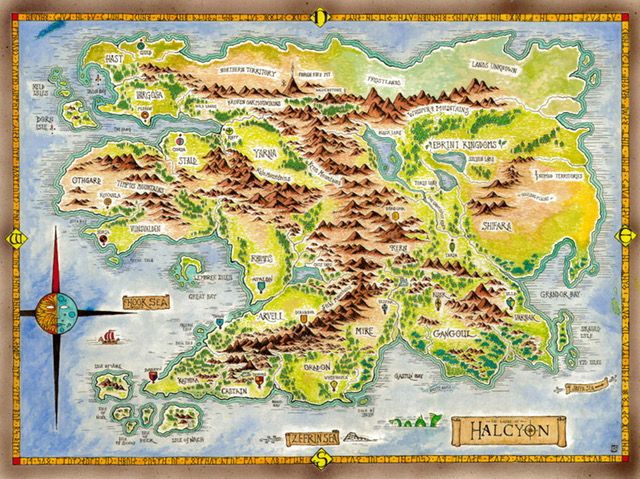It’s time. You’re starting your own campaign.
While many of us are happy to introduce
players to a published setting like the Forgotten Realms, Golarion, Tal’Dorei,
Eberron or Greyhawk, you might want to create your own world in which to do
adventure.
But how do you build a campaign world? It
seems like a daunting task to create an entire planet or continent or country,
but you can do it.
Since we’ve been building the world of Halcyon
- check out our adventures and be on the lookout for our upcoming Halcyon world
guide - we have a few tips to help you out.
Our
best advice: Get started. Start by drawing a map.
Start with a major conflict. Start with a set of characters. Just start. Once
you get the ball rolling, its momentum will keep it rolling through to the end.
Start
small. Unless your plans for running games in your
world will involve a lot of globe-trotting adventure, it’s OK to start with a
town, a city or a country. Map out what adventure may be found there. You don’t
have to have an entire planet detailed, especially if your adventures will
never go to every corner of the map.
You
don’t need everything spelled out. One of the best
ways to map out a campaign setting is to play in it. Find out what locales and
types of players like, and fill in the details that way.
Pick
some core assumptions. D&D’s wonderful Dungeon
Master’s Guide has some great ideas for world-building. One idea that explains
about D&D’s own settings is setting a few core principles, such as “much of
the world is untamed” and “the world is magical.” Create some of your own core
principles such as “monsters are everywhere,” “magic doesn’t always work,” “the
gods are absent,” “outside of cities, the world is complete wilderness” or
“much of the world is unexplored.”
Pick
some core conflicts. What is going on in the world? We
like the advice recently tweeted by Mike Mearles, D&D’s lead designer and
the co-creator of 5th edition: “When creating a setting, remember that people
make it come to life, not geography. Start with triumphs, tragedies, and
betrayals, not maps.”
 Make a
map. OK, yeah, we know we just cited a prominent
designer saying to forget geography, but for some gamers, it’s helpful to
visualize the world. So, make a map. Start with a large landmass, then fill in
forests, lakes, mountains and rivers. Then drill down even deeper with cities,
towns, roads, bridges and other locales. It will spark some creative ideas
about what types of adventure may be found in different locations.
Make a
map. OK, yeah, we know we just cited a prominent
designer saying to forget geography, but for some gamers, it’s helpful to
visualize the world. So, make a map. Start with a large landmass, then fill in
forests, lakes, mountains and rivers. Then drill down even deeper with cities,
towns, roads, bridges and other locales. It will spark some creative ideas
about what types of adventure may be found in different locations.
Create
a pantheon. What gods govern the world you’re
creating? What are their roles? Are there even gods at all? Creating the
religious aspect can help shape the world (perhaps each god has a portion of
the world they helped create) and shape the people (what factions answer to
what gods?).
Include
plenty of variety. You can incorporate anything into
your world, but to make it exciting, we suggest plenty of variety. Mountains.
Islands. Swamps. Deserts. Throw in a little of everything to make the world
exciting.
 There
be monsters. What sorts of monsters are in your world?
Are they plentiful? Or do they only live in dungeons? You can certainly
populate your world with established bestiaries, but don’t be afraid to create
a few monsters of your own making.
There
be monsters. What sorts of monsters are in your world?
Are they plentiful? Or do they only live in dungeons? You can certainly
populate your world with established bestiaries, but don’t be afraid to create
a few monsters of your own making.
Bad
guys and bad situations. Of course, there will be
benevolent kings, noble knights and respected religious orders, but you ought
to identify the bad actors in your world. What secret societies, black cults,
undead rulers, nefarious gangs and despotic dictators are active in the world?
And consequently, what forces oppose them? A lot of adventure can be found
here.
Check out our adventures, maps, monsters, and more on our website! Dungeon Crate website


No comments:
Post a Comment